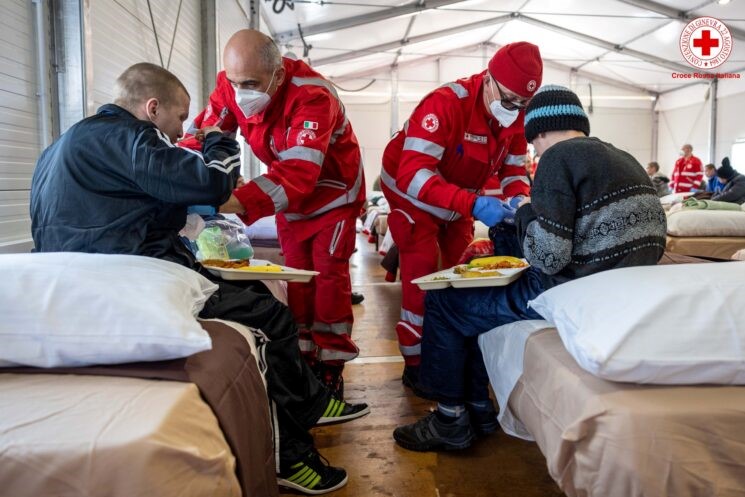
Ukraine, Red Cross tips for citizens to safeguard mental health
Mental health in Ukraine, Ukrainian Red Cross: ‘Supporting people affected by crisis events does not only mean providing humanitarian and medical assistance or meeting other social needs, but also mental health. Due to the crisis events experienced, many people in Ukraine now need psychosocial support”
The term ‘psychosocial’ indicates a dynamic interaction between a person’s psychological and social characteristics, i.e. one influences the other.
The psychological aspect is the internal (emotional and mental) processes, feelings and reactions, and the social aspect is the relationships, family ties and connections within the community, social values and practices determined by culture.
Red Cross in Ukraine: “so why provide psychosocial support (PSS)?”
Providing timely and effective psychosocial support will help prevent sadness, stress and suffering from turning into a more serious and lasting experience.
PSP volunteers help people find ways to overcome difficulties and problems, as well as the ability to restore a broken balance after a crisis event.
In this section we have prepared useful tips that will help you maintain your mental health independently in a crisis.
Taking care of a healthy sleep
Sleep disorders are a normal reaction to unusual events.
But you need to understand that sleep has a powerful effect on our quality of life.
Helping to improve the quality of your sleep is one of the best things you can do for yourself.
10 health benefits of quality sleep
- Increases energy levels (improves performance, increases physical endurance).
- Improves mental activity (better memory, concentration, learning, decision-making).
- Improves mental health (reduces stress, helps cope with anxiety, improves mood, prevents depression).
- Reduces inflammation (when you sleep, your body synthesises proteins that help improve your ability to fight infections).
- Helps you lose weight (when you don’t get the energy you need from sleep, your levels of leptin, the hormone that regulates appetite, can decrease. You will probably find yourself eating more, but this gives you short-term energy and won’t help you gain a healthy weight).
- Strengthens relationships (rest makes you more sociable, friendly, confident).
- Strengthens immunity (sleep strengthens immune cells that help the body fight infections and viruses).
- Reduces the risk of heart and blood vessel diseases, prevents stroke, diabetes and cancer (by restoring the balance of the body’s hormonal and metabolic systems).
- It helps preserve beauty and youth (the skin regenerates during sleep).
- Adequate sleep means longevity (according to scientific studies, people with adequate sleep are more likely to live longer).
The Ukrainian Red Cross’ tips for restoring healthy sleep:
- Take an evening walk.
- Put away all media (news, correspondence, social networks) 2 hours before bedtime.
- Organise the sleeping place (lighting, comfort, safety).
- Last meal should be 2 hours before bedtime.
- Make a list of worries (write down everything that bothers you on a piece of paper. Put the list aside to work on it tomorrow. Choose a few things from the list before going to bed so that less important thoughts pass through your mind).
- Observe your thoughts: imagine you are on the platform and your thoughts are like trains passing by. Don’t dwell on them, observe them and let them go.
- Use breathing practices.
Read Also
Emergency Live Even More…Live: Download The New Free App Of Your Newspaper For IOS And Android
Ternopil, Blsd Training For Ukrainian Red Cross Volunteers
Ukraine Emergency, The Extraordinary Story Of Little Makhar: The Red Cross Story
War In Ukraine: In Lutsk, Rescuers Taught First Aid To Volunteers
Mental Health First Aid Tips For 2023
Anxiety And Anxiety Disorders: Symptoms, Causes And Treatment
ALGEE: Discovering Mental Health First Aid Together
Rescuing A Patient With Mental Health Problems: The ALGEE Protocol
Basic Psychological Support (BPS) In Panic Attacks And Acute Anxiety
What Is Postpartum Depression?
How To Recognise Depression? The Three A Rule: Asthenia, Apathy And Anhedonia
Postpartum Depression: How To Recognise The First Symptoms And Overcome It
Postpartum Psychosis: Knowing It To Know How To Deal With It
Schizophrenia: What It Is And What The Symptoms Are
Childbirth And Emergency: Postpartum Complications
Intermittent Explosive Disorder (IED): What It Is And How To Treat It
Baby Blues, What It Is And Why It Is Different From Postpartum Depression
Depression In The Elderly: Causes, Symptoms And Treatment
Generalised Anxiety Disorder: What It Is And How To Recognise It
Rorschach Test: The Meaning Of The Stains


